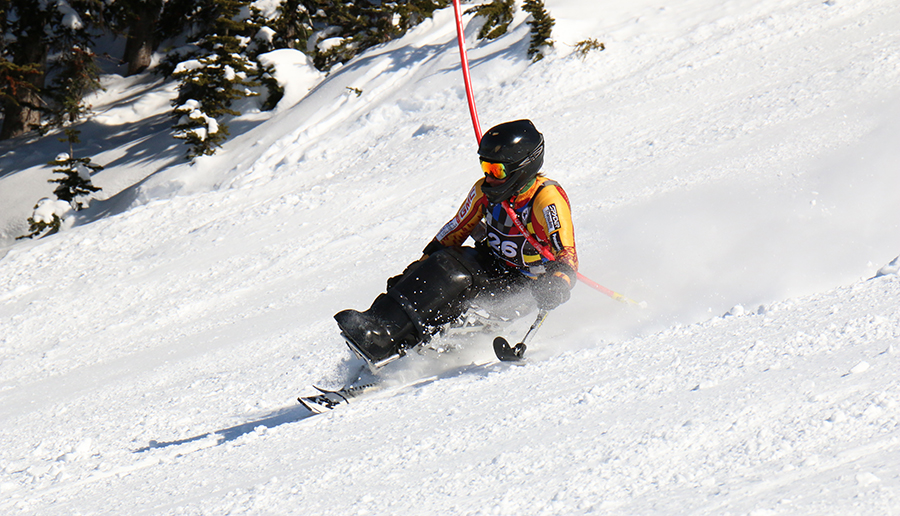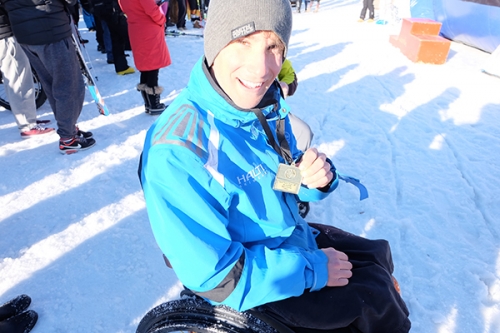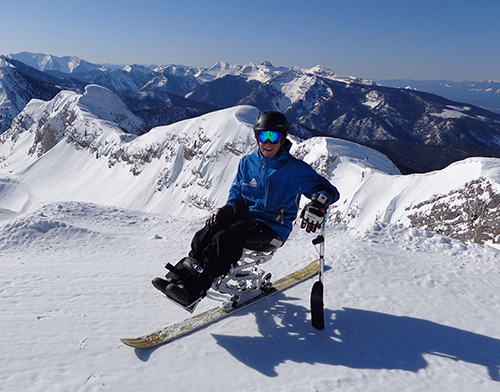Alex Cairns: from the bunny hill to the steepest chutes
Dec 18, 2015

Alex Cairns is scared. Forty feet below him, almost straight down, another sit-skier struggles to pull himself off this wall of ice that is a World Cup Slalom course. Snow has been a precious commodity this season, the little that has fallen melting quickly in the heat, then refreezing to form a hard crust, known as crud, that a ski does not want to slice. More than half of the skiers so far, all elite and many Paralympians, have been unable to find enough bite to make the extreme turns sit-ski slalom requires.
Alex was born with two open vertebrae in his back. There was no reason for this, and no cure. The doctors put him back together, leaving him with paralysis at the L4-5 level. That means he has no feeling below his thighs and uses a wheelchair for everyday living. Alex says this leaves him in a pretty good position to do, well, anything. Aged seven, his parents strapped his feet to the pedals of his bicycle and let him go. It worked out pretty well.
 At fifteen, his mother and grandmother signed him up for an adaptive ski program. He sucked. Adaptive skiing gives anyone with a disability the equipment and training to feel the pull of gravity down the mountain, to be scared and thrilled on the edge of control and chose which way to go. In British Columbia these programs are supported by BC Adaptive Snowsports, which, amongst other things, provides loaner equipment and trains volunteer instructors. BC Adaptive Snowsports receives financial support from the Squamish Community Foundation to help Squamish residents like Alex, so when Alex signed up there was a sit-ski and an instructor for him. That worked out pretty well.
At fifteen, his mother and grandmother signed him up for an adaptive ski program. He sucked. Adaptive skiing gives anyone with a disability the equipment and training to feel the pull of gravity down the mountain, to be scared and thrilled on the edge of control and chose which way to go. In British Columbia these programs are supported by BC Adaptive Snowsports, which, amongst other things, provides loaner equipment and trains volunteer instructors. BC Adaptive Snowsports receives financial support from the Squamish Community Foundation to help Squamish residents like Alex, so when Alex signed up there was a sit-ski and an instructor for him. That worked out pretty well.
Adaptive skiing is great for going down the mountain. Up? Not so much. For two years, Alex was stuck on the bunny slopes, taking a slow ride up the magic carpet after each run, seeing the learning curve of traditional skiers take them to green and blue runs. But he kept moving. After two seasons he started taking the lifts higher up the mountain. Ski lifts are not built for sit-skis. Alex always had a strong upper body, but the effort required to maneuver the metal framed sit-ski on a lift was enormous. He got stronger and mounting and dismounting got easier. Sometimes a well-meaning skier would try to help him up. That usually didn’t work out so well.
Alex pushes his body every day, like all elite athletes do. We are all constrained by our bodies, one way or another. Sometimes the constraints of other people’s expectations are harder to overcome, but Alex has a charm and confidence unusual for a guy who is in his early twenties. Sometimes people who have seen his freestyle ski videos online come over, excited to meet him. He’s still getting used to that.
Alex skis everything now. Runs that would make an expert skier blanch, like the Coffin on Whistler Mountain. The Coffin is a “couloir”, a narrow chute that gives no room to turn, especially on a sit-ski. Once you are in it there is no turning back or slowing down, just a series of straight drops on some of which you will get “air”. Alex likes to get air.
Two seasons ago, Alex won the Provincial Slalom Championships as a member of the BC Para-Alpine Ski Team, another BC Adaptive Snowsports program. Alex was inspired by the energy of the other adaptive skiers around him, like he has always been inspired by his friends and family. He had a decision to make; keep skiing freestyle, getting all the air he wanted, or make a push for the National Team and, maybe, a place at the Paralympics. With the support of those around him, he chose to push on for the Nationals. Of course he did.
 Skiers in BC will tell you that the 2014-15 season is the worst they’ve ever seen; a once-in-a-century year. Many BC mountains have hardly opened at all, most of the others only offering hard crud. Now aged 23, this is Alex’s make or break season. These conditions are where Alex gets his shot at the National team.
Skiers in BC will tell you that the 2014-15 season is the worst they’ve ever seen; a once-in-a-century year. Many BC mountains have hardly opened at all, most of the others only offering hard crud. Now aged 23, this is Alex’s make or break season. These conditions are where Alex gets his shot at the National team.
The run clears and there is silence before the starting beep goes. Alex pushes through the gate, slipping straight down the icy slope. The weight of a sit-ski, even the ultra-light elite models that cost upwards of $8,000, gives a huge acceleration on steep runs. Almost instantly, he is going too fast, unable to carve into the impregnable snow enough to turn around the first gate. With all his strength, he leans and digs in with his outriggers, like mini skis on the end of poles, and turns enough to make it around.
Alex finished his first World Cup start. He is also now the Canadian National Champion in men’s slalom sitting. It’s been a long season, on the road constantly, competing at events across Canada and in the US. It’s a Spartan life. Para-sports do not pay well; do not pay at all in general. But it’s one that he loves. He’s on the Canadian National Development Team with high hopes for this season. Does he miss having the time for freestyle? Yes, but he’s happy with his decision to throw himself into this journey. So far, it’s working out pretty well.
Story written by Andy Price
BC Adaptive Snowsports (formerly The Disabled Skiers Association of BC) has been delivering adaptive snowsports programs throughout BC since 1973. From first contact opportunities to the BC Para Alpine Ski Team, BC Adaptive Snowsports introduces individuals with physical and/or cognitive disabilities to the freedom and therapeutic benefits of skiing and snowboarding. For information on BC Adaptive Snowsports visit our website www.bcadaptive.com
For more information about the Para-alpine ski program or Adaptive Skiing or Snowboarding, please contact Fannie Smith at 604.333.3630 x 202 or via email fannie@bcadaptive.com
